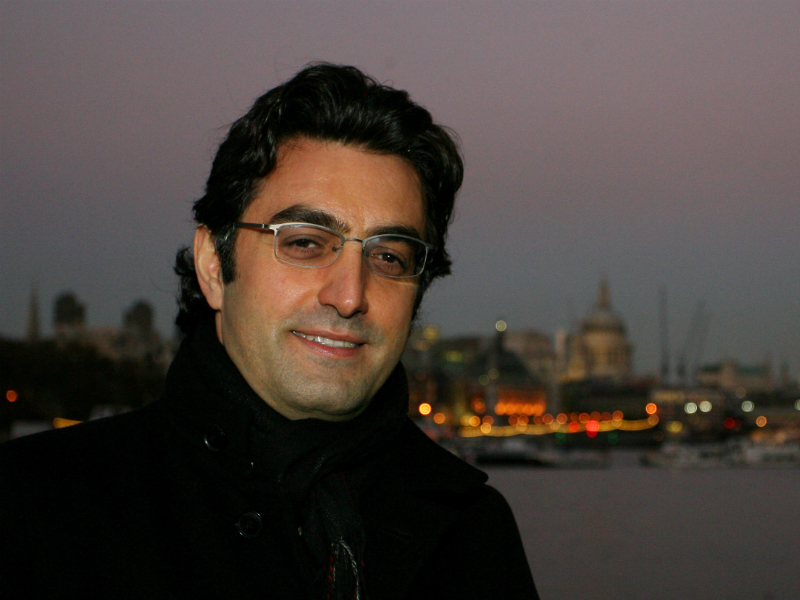Roughly eight months into Mansour Omari’s prison time, when he lived in a tiny underground Syrian prison cell crammed together with dozens of other men, one of his fellow inmates had an idea. Omari’s cellmate walked to a corner of the room, spit some blood from his bleeding gums into a plastic bag, mixed it with rust from the steel bars and wrote his name on a sliver of fabric – a memento to prove they were alive.
The other men did the same, hiding the fabric pieces in the collar of a shirt. Whoever left first would wear the shirt and tell their story. Three weeks later, the guards called Omari’s name. He was leaving.
“When I heard my name, I just jumped to the shirt,” he says in the new documentary, 82 Names: Syria, Please Don’t Forget Us. The film will receive its Canadian premiere at this year’s Toronto Jewish Film Festival (TJFF), in keeping with this year’s theme: the obligation that modern-day Jews have toward helping refugees.
While TJFF organizers have curated several films that address this theme – including one called Curtiz, which is about the largely Jewish-refugee film crew that created Casablanca – none connect history’s dots as clearly as 82 Names, which follows Omari’s global journey to various Holocaust memorials, to educate people about the horrors of what’s happening in Syria today.
Omari fled the country in 2013, smuggling out the names of 82 Syrians whom the government claimed had “disappeared.” Omari loaned those fragments of tattered cloth, adorned by bloody scrawl, to the U.S. Holocaust Memorial Museum in Washington, D.C.
“The minute Mansour came to us with these cloths with the names, we immediately, at the Holocaust Museum, understood the power of this,” says Sara Bloomfield, the museum’s director, in the documentary. “Because over and over again, you would hear survivors of the Holocaust say, ‘Remember me. Don’t forget me. Tell my story.’ The Nazis wanted to obliterate the individuality of its victims.
“They wanted to make it a mass statistic that would easily be forgotten. But by bringing out those names, we restore to them a bit of the dignity and individuality that the Assad regime tried to take away from them.”
It was at that museum that Canadian-Iranian documentary filmmaker Maziar Bahari first heard about Omari. He didn’t meet Omari then, but the refugee’s story intrigued him. Bahari is perhaps best known as the journalist who was jailed and tortured by Iranian officials in 2009 and later wrote a book about the experience, which Jon Stewart adapted in his directorial debut, Rosewater, in 2014.
READ: A FATHER-SON ROAD TRIP DOWN HOLLYWOOD BOULEVARD
Bahari spent months researching Omari’s story, while scheduling interviews with historians, curators and Holocaust survivors. Omari was eager to share his story, but the experience was emotionally draining.
“I didn’t have any idea that his reaction would be so strong,” Bahari tells The CJN over the phone from London, England. “He was really, really affected by the (concentration camp) Sachsenhausen.”
Bahari understands the tragic history of Jewish refugees. His first film was The Voyage of the St. Louis, a documentary about the infamous ship carrying more than 900 Jews in 1939 that was turned away from various countries, including Canada.
Prime Minister Justin Trudeau apologized for the shameful decision last year, and when Stuart Hands, the TJFF’s program director, discovered that Bahari had also filmed a documentary on that infamous ship, he knew Bahari would be a perfect fit. (The Voyage of the St. Louis will also be screened at this year’s festival.)
Bahari says that, as an Iranian immigrant to Canada, his interest in Judaism has been multifaceted. On the surface, the story of the St. Louis was simply fascinating – and largely unknown in 1994. Most of his Jewish friends didn’t know about the history of their own people.
On another level, Bahari recognized the value of solidarity among minority groups. “I wanted to prove that not all Iranians are anti-Semitic,” he says.
“I believe not only Jews should make films about Jews, or Muslims should make films about Muslims. This is a human story. When Jews said ‘Never again,’ it should not just be ‘Never again for Jews.’ ”
Maziar Bahari will attend the TJFF screenings of both his films: 82 Names on May 7, and The Voyage of the St. Louis on May 8. Visit TJFF.com for tickets and times.
